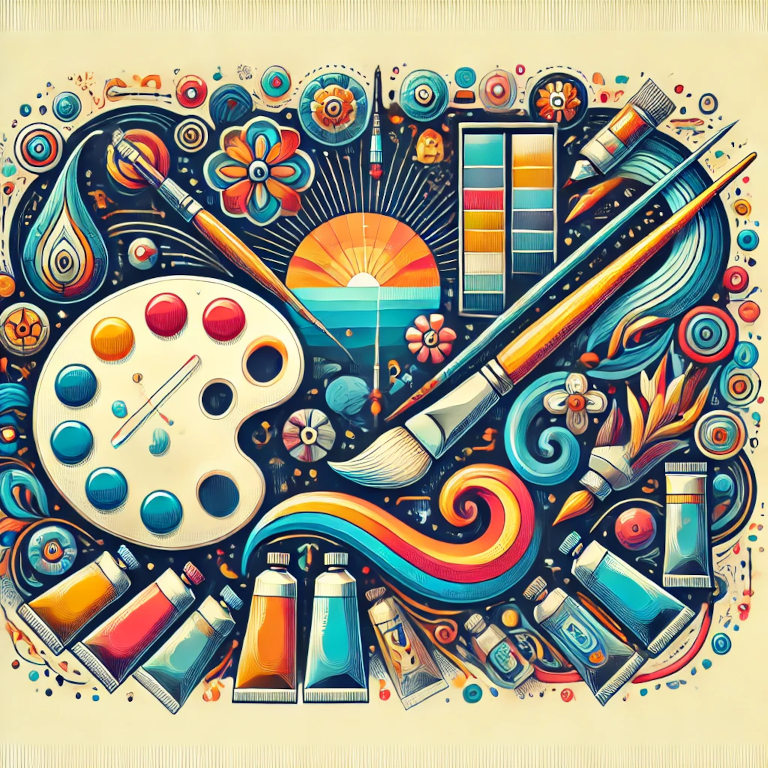DIY painting and art projects offer a wonderful way to express creativity, relieve stress, and enhance your living space with personalized touches. Engaging in these activities can be both fulfilling and therapeutic, providing a platform for artistic exploration. As an expert in DIY and Crafts, I will guide you through the basics of DIY painting and art, offer tips on materials and techniques, and inspire you to embark on your own creative journey.
The Joy of DIY Painting and Art
DIY painting and art involve creating original artwork or refurbishing existing items using various painting techniques and materials. This hands-on approach allows individuals to experiment with colors, textures, and designs, resulting in unique and personalized creations.
Essential Materials for DIY Painting and Art
Before diving into DIY painting projects, it is essential to gather the right materials. Here are some fundamental items you will need:
Paints
- Acrylic Paints: Versatile and quick-drying, acrylic paints are ideal for beginners and suitable for various surfaces, including canvas, wood, and fabric.
- Watercolors: Watercolors are perfect for creating delicate, translucent effects and are commonly used on paper.
- Oil Paints: Known for their rich colors and slow drying time, oil paints are great for detailed work and blending.
Brushes
- Flat Brushes: Ideal for broad strokes and filling in large areas.
- Round Brushes: Perfect for detailed work, lines, and curves.
- Detail Brushes: Small brushes designed for intricate details and fine lines.
Surfaces
- Canvas: A popular choice for painting, available in various sizes and textures.
- Wood: Provides a sturdy surface for painting and is great for furniture or decorative pieces.
- Paper: Suitable for watercolors, sketches, and mixed media projects.
- Fabric: Allows for customization of clothing, bags, and home décor items.
Additional Supplies
- Palette: For mixing and blending paints.
- Easel: Provides a stable platform for your canvas.
- Painter’s Tape: Useful for creating clean lines and protecting areas from paint.
- Varnish: Seals and protects your finished artwork.
Techniques for DIY Painting and Art
Understanding various painting techniques can help you achieve different effects and enhance your artwork. Here are some popular techniques to explore:
Dry Brush Technique
The dry brush technique involves using a dry brush with minimal paint to create a textured, scratchy effect. This technique is excellent for adding highlights and texture to your work.
Wet-on-Wet Technique
In the wet-on-wet technique, wet paint is applied onto a wet surface, allowing colors to blend seamlessly. This method is commonly used in watercolor painting to create soft, flowing effects.
Layering
Layering involves applying multiple layers of paint to build depth and richness in your artwork. Each layer must dry before the next is applied, allowing for intricate details and complex color combinations.
Stippling
Stippling is a technique where small dots of paint are applied to create texture and shading. This method can be used with various types of paint and is great for adding depth and dimension.
Splattering
Splattering involves flicking or spraying paint onto the surface to create a random, textured effect. This technique is fun and can add a dynamic element to your artwork.
DIY Painting and Art Project Ideas
To inspire your creative journey, here are some DIY painting and art project ideas that you can try:
Abstract Canvas Art
Abstract art allows for complete creative freedom, using colors, shapes, and textures to express your emotions and ideas. Experiment with different brushstrokes, layering, and color combinations to create a unique piece.
Painted Furniture
Revamp old furniture with a fresh coat of paint. Use stencils, painter’s tape, and various painting techniques to create patterns and designs that match your style.
Custom Wall Art
Create custom wall art to decorate your home. Try painting inspirational quotes, nature scenes, or geometric patterns on canvas or wood panels.
Fabric Painting
Personalize clothing, tote bags, or pillowcases with fabric paint. Use stamps, stencils, or freehand designs to create unique pieces that showcase your style.
Nature-Inspired Art
Draw inspiration from nature to create beautiful artwork. Paint landscapes, flowers, or animals using various techniques to capture the beauty of the natural world.
Tips for Successful DIY Painting and Art Projects
To ensure your DIY painting and art projects are successful, consider the following tips:
Plan Your Design
Before starting your project, sketch out your design and plan the colors and techniques you will use. Having a clear vision can help you stay focused and achieve your desired outcome.
Practice Techniques
If you are new to painting, practice different techniques on scrap paper or canvas before applying them to your final piece. This will help you build confidence and refine your skills.
Use Quality Materials
Investing in high-quality paints, brushes, and surfaces can significantly impact the outcome of your project. Quality materials provide better coverage, durability, and overall results.
Be Patient
Painting can be a time-consuming process, especially when working with techniques that require multiple layers or drying times. Be patient and allow each layer to dry thoroughly before proceeding.
Experiment and Have Fun
Don’t be afraid to experiment with different colors, techniques, and designs. The beauty of DIY painting and art is the freedom to explore and create without limitations. Enjoy the process and let your creativity flow.
Summary
DIY painting and art offer a rewarding way to express creativity, enhance your living space, and develop new skills. By understanding the essential materials, techniques, and project ideas, you can embark on a creative journey that reflects your unique style and personality. Whether you are a beginner or an experienced artist, the world of DIY painting and art is full of possibilities. Embrace the joy of creating and discover the endless potential of your artistic abilities.






